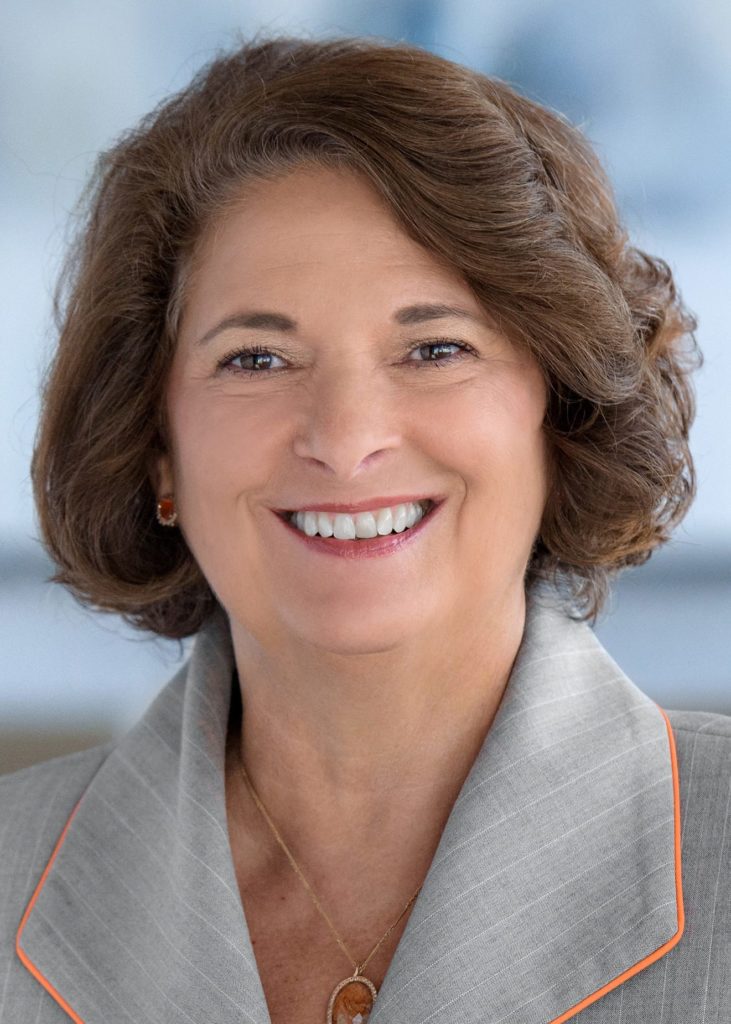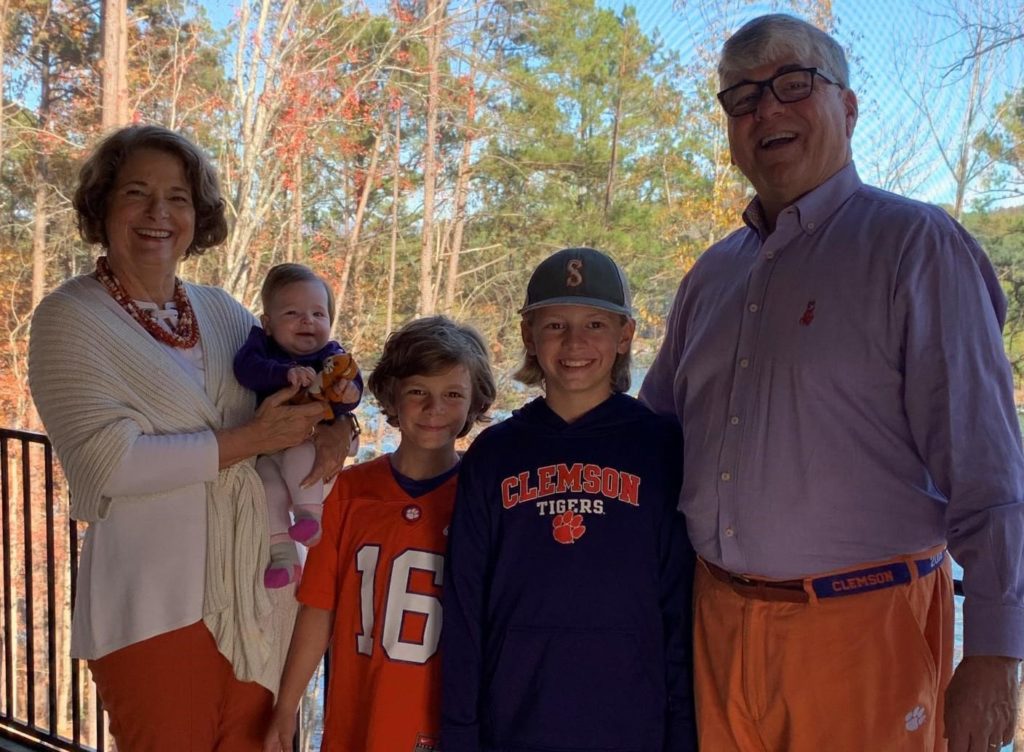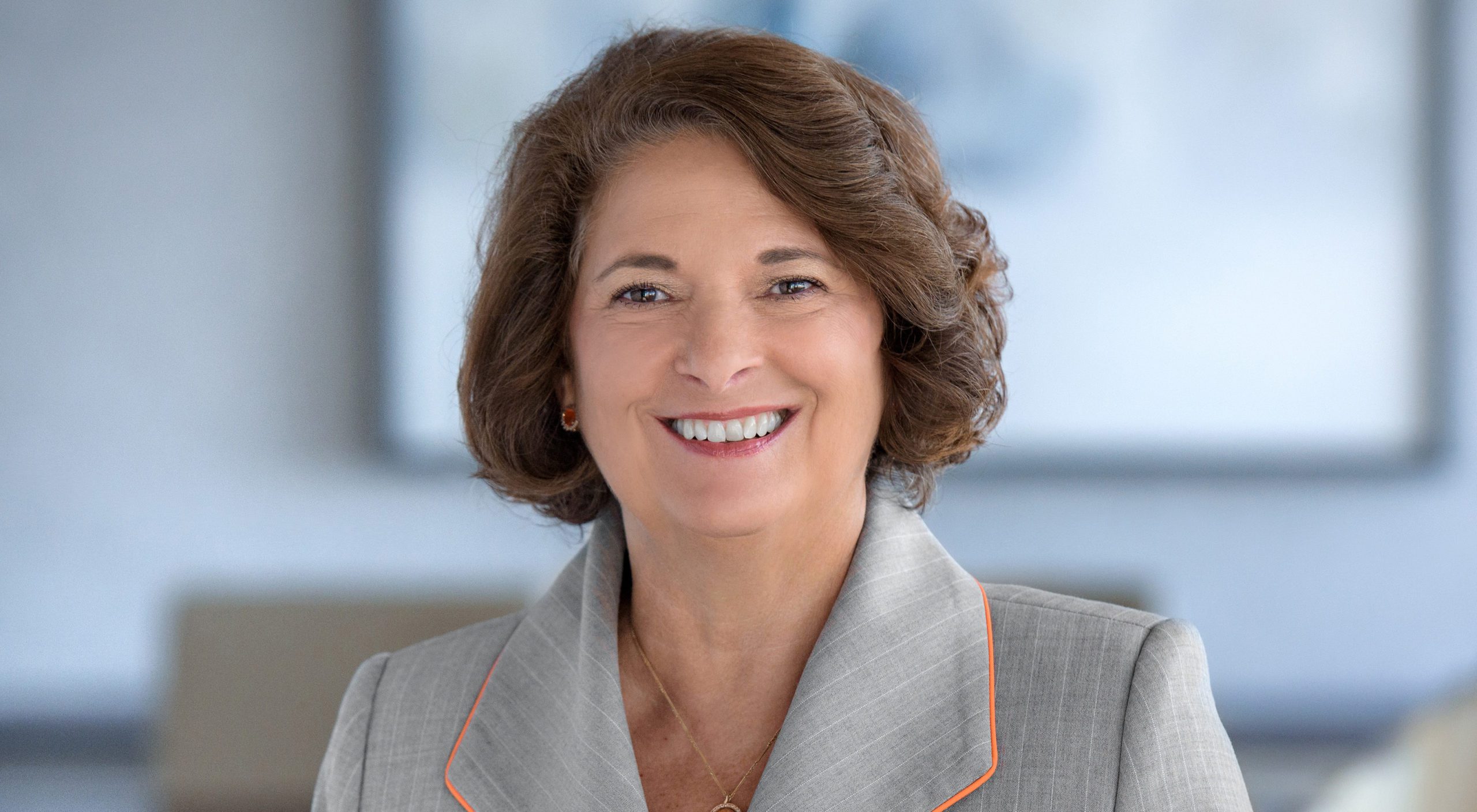When Kim Wilkerson graduated from Clemson University in 1980 with a degree in financial management, the Clemson Board of Trustees member and banking executive of more than 40 years, embarked on a career in a male-dominated industry.
She quickly proved her leadership acumen, earning her stripes and a “seat at the table” as being the first female to be named president of a South Carolina bank.

Fast forward to 2021, the wife of Avery, mother of two sons, Bland and Allen, and grandmother to Avery Bland “Ab”, 12; Aiden, 8; and Ellie, 8 months, continues to build a legacy through her leadership. As South Carolina president and managing director for Bank of America, and as a Clemson trustee, Ms. Wilkerson is “making decisions today that will impact Clemson students not yet born.”
Wendy York, who is charged with developing the next generation of Clemson business leaders as Dean of the Wilbur O. and Ann Powers College of Business, is effusive in her admiration of Ms. Wilkerson’s many professional accomplishments, all while maintaining an optimal work-life balance.
“Kim is a role model who lives by three qualities that are important to me – being authentic, brave and inclusive. She’s an authentic leader who is very comfortable with the power that she earned, and classy about how she exercises that leadership,” the dean said. “Kim is inclusive in that she’s not threatened by others in power and is the kind of leader people want to follow. I’ve witnessed her generous spirit in a number of ways, one being how she quietly opens doors for others to succeed.”
In the spirit of recognizing Women’s History Month, Ms. Wilkerson shared her thoughts on leadership, love of family – including those connected to business and her alma mater – taking risks, and post-pandemic positives.

Describe your leadership style and how it has evolved over time to make you a better leader?
I’m collaborative. We all come with different backgrounds and leadership styles based on our experiences. In the business world, you’re exposed to many backgrounds and the experiences of others can be invaluable to you. I think so much can be learned from observing different leadership styles.
I came out of Clemson and into a male-dominated (banking) industry back in the ‘80s. I was very fortunate to have leaders and mentors who believed women should have a seat at the table. Throughout my career, I’ve learned that by collaborating with others, you come to great decision making. You don’t have to have role models who look or think like you.
It’s important to surround yourself with people smarter than you and with different styles and perspectives. A collaborative leader then listens to those people, resulting in better decision making and consequently better business outcomes.
Why is servant leadership so important and provide an example of how you’ve illustrated that quality in your career?
I grew up blessed with fabulous parents who told me I could be anything I wanted to be. My daddy was smart, an engineer. He instilled in me a passion for education. Servant leadership, I learned from my mother. I remember her examples of servant leadership at a very young age. She brought a little boy home from Carolina Children’s Home for the weekends and taught adults how to read. She taught me at an early age that giving back to others was important.
For me, my role as a trustee at Clemson is a passion and one way that I enjoy giving back. It’s about making a difference in people’s lives. I remember a note I received as a new trustee that read, “the decisions you make today will impact Clemson students not yet born.” Another simple quote that’s stuck with me over time and is applicable to servant leadership is, “God gave you a fingerprint that no one else has, so you can leave an imprint that no one else can.”
Explain why it’s important for a leader to “be your authentic self and lift as you climb.”
I believe the most important legacy one can leave is to develop future leaders and as that leader climbs, bring others along. When you climb, you lead in your own unique way and inspire others to lift as they climb.
People figure out very quickly if you’re not authentic, and I’ve found people who are authentic are much more likely to be successful. It’s insincere to pretend, and I’ve learned that when you’re comfortable in your own shoes, you’re a better leader. Being authentic is the only way I know how to lead. I cannot pretend to be something I’m not.
In explaining the importance of being yourself and putting forward your authentic self to others, I hearken back to the ‘80s. Back then, bankers wore black, gray and navy-blue suits. Well, my husband bought me this gorgeous bright green suit. I wore that suit with a bright yellow blouse and a green and yellow bowtie into the office one day. I was obviously very different from my peers, but it was who I was – and an example of me being my authentic self.
By all accounts, you balanced family and career very well over 40 years. What above all was crucial in making that happen?
Its two things – having an incredibly supportive husband and working for an amazing company.
Here’s a story that may help answer the question: I was 33 years old and in a leadership role. My husband Avery was very busy in his career and was also mayor of our community, plus we had two little boys. Our hectic schedules made it necessary for us to map out our weeks, including how we would pick up our very young sons after school. I recall a very cold December evening where a meeting ran long and I was late picking up my boys from daycare. When I arrived at daycare, my oldest son Bland, with alligator tears rolling down his cheeks, said, “Mommy, I thought you had forgotten me.” I felt like the world’s worst mother.
From December to May, I had very deep discussions with Avery about my future and on May 13, I resigned from the bank. That decision wasn’t well received by my boss, his boss and the top boss. They said I couldn’t resign, and I said, I can, and I have.
What they did next was propose a way to keep me employed. They told me to take a summer sabbatical and come back in the fall and work 8-2 p.m., in a new program called Select Time. They took a chance on a young, hardworking and energetic employee and that’s why I’m still here nearly 41 years later. By working 10 years on Select Time, I was able to spend time with my children. It was the smartest thing I ever did. Not only did the bank’s leap of faith keep me employed, they kept promoting me during those 10 years.
What advice would you give a female business student on what is necessary for her to succeed in any business environment?
First, it’s OK to take risks. Women and men often approach things differently and an example of that is in applying for jobs. When a man reads a job posting and thinks he meets 60 percent of the criteria, he’ll apply. A woman looking at that same posting may not apply if she doesn’t think she meets 100 percent of the criteria. … Another bit of advice I’d offer is when you earn a seat at the table, don’t waste it. Speak up and be heard. It’s important to leverage those opportunities. Also, you must be a lifelong learner and pursue getting better every single day – and be flexible. Pivoting and adapting to change is important. Being inflexible and unwilling to change will derail a career.
What is an essential emphasis, or competency, for a business school today that may not have been a focus when you were receiving your business education at Clemson?
It must be communication, not that I wasn’t taught to communicate while at Clemson. Then, though, it was less about how you lead and more about the disciplines like economics and accounting. But also, today’s emphasis must be on how to lead and use data and information in business decision making.
Communication is so important in business. When you make things more personal, things resonate, like stories. Being able to tell a story in a way that articulates a vision and has people listening is important.
As we send our students into the world, it’s important for them to be competent communicators. They must understand differences and be able to broaden their horizons. For example, students today may go to an international business where they would be working with people from very different cultures and backgrounds. They must be able to effectively utilize their communication skills and their own value, as well as accept others’ views, to excel in environments very different than what they’re accustomed.
How would you explain to a soon-to-be graduate the importance of staying connected to Clemson, and why it’s important to give back in some way to your alma mater?
Jim Barker (former Clemson president) used to say to alumni, “Welcome home.” And it’s so true. Clemson is truly a special place, and when you return here, you truly are coming back home. It’s about family and giving back. Staying connected is so important for career and personal reasons. So many of your lifelong friends are those you met while at Clemson, and it’s a great way to stay connected to those friends.
As far as giving back, you gain so much by helping others. I have always believed it is important to help, in some way, those who are following in your footsteps. And getting involved and giving soon after you graduate helps you stay connected for the longer term.
What business positives do you see coming out of the 2020 pandemic?
There will be a lot of positives coming out of this, with the focus on technology being one of them. We are much more technology savvy. Technology has enabled us to adapt to best serve our clients during the pandemic. In many ways, the new way of virtually meeting has helped everyone personally connect and become even closer. WebEx and Zoom are how I live these days.
And the innovative thinking that has come out of this very trying period of time is amazing. I’ve seen new businesses surface in this environment, and existing businesses have adapted and accelerated their business models. Restaurants, for example, have accelerated home delivery and curbside service.
Health and wellness is another area that may result in positive changes. Because many of us are working from home, people can sit in the sun and eat chicken noodle soup outdoors while checking emails. Some of us may be exercising more and eating better because we’re not dining out all the time. The environment has required us to not only be more innovative, but to focus more on the importance of family. Many families are spending more time together. I think it will change how we think and approach life in general.
# # #
Get in touch and we will connect you with the author or another expert.
Or email us at news@clemson.edu

